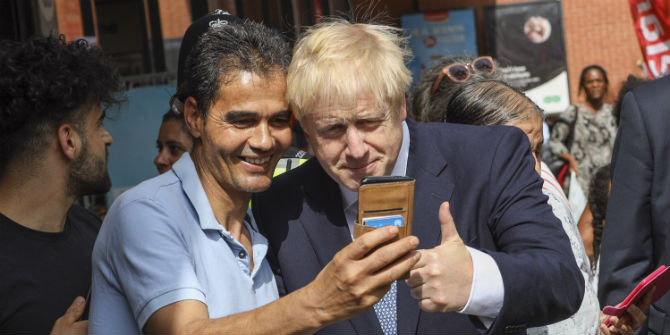 Boris Johnson’s public persona has been carefully honed over the years, writes Candida Yates (Bournemouth University). Most male politicians have been paternalistic in style: the new PM has instead sought to resemble a fraternal figure, who conjures up a nostalgic irreverence for authority.
Boris Johnson’s public persona has been carefully honed over the years, writes Candida Yates (Bournemouth University). Most male politicians have been paternalistic in style: the new PM has instead sought to resemble a fraternal figure, who conjures up a nostalgic irreverence for authority.
Last week, an inflatable ‘Boris blimp’ could be seen floating over London as thousands marched against Brexit and Boris Johnson. Now he has been crowned the Conservative party leader and Prime Minister. As with Donald Trump, who was also given the blimp treatment on a visit to London, there are similarities between the ‘real’ Johnson and his inflatable double – both signifying emptiness and plastic superficiality buoyed up by an inflated sense of self-worth. It is not surprising that Johnson, who resembles a kind of toy with whom the electorate can play, lends himself so well to the comical blow-up doll floating above the crowds, inflated by so much hot air.

The performative, upbeat style of Johnson’s leadership campaign – as optimist, blagger and loveable rogue – represents a continuation of the public image he has built up over the years. His communication skills have been honed in various media and political settings, and his celebrity status is such that he is regarded as ‘political box office’ (Channel 4, 2019). Johnson continues to draw on the familiar, playful routines that worked so well for him during his time as London mayor (2008-16), a period which he regularly cites in interviews. Given his woeful record as foreign secretary (2016-18), one might even see that period in City Hall as his heyday – despite reports of his ‘baffling’ incompetence with regard to financial expenditure and other matters (Jenkins, 2019). While his charismatic public image enabled him to shore up his power base in his bid to become party leader and PM, it is not always easy to square his professional ambition with his comical masquerade and public reputation.
His seemingly authentic and spontaneous, unspun qualities as a fearless ‘can-do’ politician have been key to his ability to connect with the public, and his recourse to the language of ‘feeling good’ also reflects the close relationship between the performativity of celebrity politicians and the emotionalisation of politics today (Yates, 2019). The ways in which certain sections of the electorate relate to and identify with politicians such as Johnson provide further examples of such emotive processes at work. Deploying a psychodynamic analysis of the emotional investment in Johnson as a populist politician allows us to understand the structures of feeling that shape his appeal, and also the affective dynamics of contemporary political culture more widely.
As we know, Johnson has constructed a persona as a benign, old-school English eccentric, who refuses to identify with superego figures of authority – such as those labelled in pejorative terms as members of the out-of-touch ‘metropolitan elite’, or as faceless EU technocrats. He deployed a similar strategy when opposing Jeremy Hunt whose capacity to be ‘on top of policy detail’ was also spun as dull and technocratic. In the past, psychoanalytic studies of leadership have focused on the processes of fantasy around politicians as idealised parental figures, where the vertical structures of identification shape the relationship to them as objects of the psycho-political imagination. Today, however, Western democracies are influenced by a loss of faith in the old structures of authority: the hierarchical Oedipal identifications in public life have been challenged by the sociopolitical and cultural forces of late modernity. As an ambitious politician, Johnson is both a product of this wider context but also one who has been able to exploit the shifting patterns of identification to his advantage.
The increasing influence of social media across all levels of society often leads to more horizontal, ‘sibling’ structures of fantasy and identification. The popularity of Johnson’s playful persona with sections of the Conservative electorate – who are predominantly men – invites such fraternal rather than paternal identification, providing a perfect foil for perceptions about the ‘faceless authoritarian’ figures of the EU and the ‘elitism’ of its governing bodies. With his teddy bear looks and public gaffes that make people laugh, Johnson is, for some, a seductive figure; any notion of governance associated with his role as a senior politician is thus undercut and can be deflected elsewhere onto his opponents and the so-called ‘elite’, of which he is course a member. His apparent lack of deference to the establishment sits well with an electorate who are increasingly cynical and disenchanted with politics, and he manages to ward off any potential ressentiment of his position as an elite politician by representing himself as an un-impinging figure that people can enjoy.
Johnson often mocks the pomposity of those in the establishment who lack his ‘optimism’ and who too often call on the so-called ‘dull’ authority of ‘experts’. By contrast, Johnson’s very traditional English trait of celebrating amateurism and of refusing to take things too seriously taps into his populist appeal. It allows him to associate himself with a mode of English nationalism underpinned by the symbols of English cultural nostalgia, thereby appealing to his English base within the Conservative party membership – a generation raised on Jammie Dodgers and comics such as The Beano with cartoon characters that resemble the comical persona of Johnson himself. And yet, this nostalgic cultural imaginary also represents a retreat to a realm of psychosocial and political relations shaped by the values of empire and the injuries of racialisation, gender and social class.
The use of nostalgia as a defence against the losses and uncertainties of contemporary culture has been discussed at length, and the desire to turn back also taps into deep-rooted concerns about change and of being ‘left behind’ by the forces of modernity (Yates, 2015). For many, such anxieties played a key role in motivating them to vote to leave the EU, and Johnson’s image and leadership style resonates in that respect (Eaglestone, 2018). A cultural desire to look back – or at least to turn away from contemporary malaise and to identify instead with Johnson’s retro style – can be seen in this broader psycho-political and cultural context, but it is also framed by the experience of social and economic precarity. At the collective level, a fantasy of history is returned to and remains unmourned as, for example, in Jacob Rees-Mogg’s (2019) idealised account of Britain’s place in the world as a colonial power.
In contrast to figures such as the strangely serious and fastidious-looking Rees-Mogg, Johnson – like his hair – functions as a signifier of chaos and vivacity which, in the UK at least, is still unusual for high-profile politicians in public office. Johnson’s ‘Samson moment’ – having his hair cut in order to appear more convincing as a PM in waiting – is a reminder of his ‘as-if’ status as a boy in the public domain. However, as we have seen, there are a number of tensions between Johnson’s comical Just William persona and his new role as the PM who has set a course to sever ties with Europe. We are told that Johnson likes to be liked, and was shocked when he was heckled by Londoners as he left his house following the referendum result in 2016. Despite his current popularity with members of the Conservative party, the contradictions of his public persona will be tested, and the public may grow impatient with the vacuity of his performance as so much hot air.
References
Eaglestone, R. (ed.) Brexit and Literature. London: Routledge.
Rees-Mogg, J. (2019) The Victorians: twelve titans who forged Britain. London: Random House.
Yates, C. (2019) ‘“Show Us You Care!” The gendered psycho-politics of emotion and women as political leaders,’ European Journal of Politics and Gender (in Press).
Yates, C. (2018) On the psychodynamics of Boris Johnson and Brexit, New Associations, (25): 4-5.
Yates, C. (2015) The Play of Political Culture, Emotion and Identity. Basingstoke: Palgrave Macmillan.
Yates, C. (2014) Political Sport and the Sport of Politics: A Psycho-Cultural Study of Play, the Antics of Boris Johnson and the London 2012 Olympic Games. In: Bainbridge, C. and Yates, C. (2014) (Eds.) Media and the Inner World, Psycho-Cultural Approaches to Emotion, Media and Popular Culture. Basingstoke: Palgrave Macmillan. pp. 34-53.
Acknowledgment
My thanks to Iain MacRury for pointing out the Johnson ‘Samson moment’.
This post represents the views of the author and not those of the Brexit blog, nor LSE. An extended version of some of the themes raised here can be found in: Yates, C. (2018) ‘On the psychodynamics of Boris Johnson and Brexit’, New Associations, (25): 4-5.
Candida Yates is Professor of Culture and Communication at Bournemouth University, UK. She is a Director (with Caroline Bainbridge) of the research network Media and the Inner World and a Founding Scholar of the British Psychoanalytic Council. Her publications include: Political Leadership and the Psycho-Cultural Imagination (forthcoming, Routledge); The Play of Political Culture, Emotion and Identity (2015); Media and the Inner World: Psycho-Cultural Approaches to Emotion, Media and Popular Culture (co-ed, 2014), Television and Psychoanalysis (co-ed, 2013) Emotion: New Psychosocial Perspectives (co-ed, 2009); Culture and The Unconscious (co-ed, 2007) and Masculine Jealousy and Contemporary Cinema (2007).






